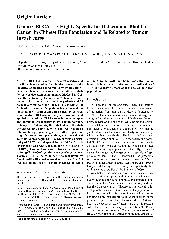摘要
BLCA-4 is currently the most sensitive and specific urinary marker for bladder cancer. As the incidence of bladder cancer varies by ethnic and territory, we tended to evaluate the feasibility of bladder cancer detection using urinary BLCA-4 in Chinese Han nationality. Urines from 79 bladder cancer patients, 31 urinary tract infection patients and 29 normal controls were included. Tissue specimens of 53 bladder cancers, 24 pathologically normal tumour-adjacent urothelium and 15 healthy controls were involved. BLCA-4 antibody was produced and applied in an indirect ELISA assay for urine samples and immunohistochemistry study in tissue samples. Urinary BLCA-4 was significantly higher in the bladder cancer group (P = 0.0001). The level was in no relation to age, gender, growth pattern, grade or stage. Discrepant to reported data, a cut-off value of 1.7 x 10(-4) A was acquired here, which yields a sensitivity of 97.37 A and specificity of 100 %. Muscle invasiveness was related to a higher BLCA-4 level (P = 0.0175). Tumour tissues were also scored higher in staining (P=0.0001), yet this was not related to invasiveness. In 41.67 % of adjacent normal tissue we found positive BLCA-4 expression. Urinary BLCA-4 was also highly specific in bladder cancer detection in the Chinese, with additional indicative value in muscle invasiveness detection. A cut-off value of 1.7 x 10(-4) A may be more adaptive to Chinese Han population.
- 出版日期2011
- 单位复旦大学
